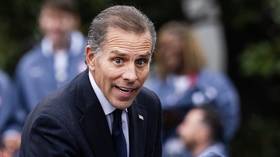Britain’s ex-spy chiefs got rich off ‘Russian threat’ warnings, but IGNORED alarm bells on pandemic risk – report

What do Britain’s former spy chiefs get up to after they leave their posts? They make “millions” scaremongering about the “Russian threat” and lobbying the government on behalf of private interests, a new investigation confirms.
Nine out of 10 former MI6, MI5 and GCHQ chiefs have taken jobs in the cyber security industry since 2000, a sector they repeatedly promoted as crucial to defend the UK against Russia while in office, investigative website Declassified UK revealed.
The “revolving door” between government and industry is supposed to be regulated by the Advisory Committee on Business Appointments (ACOBA) to avoid conflicts of interest, yet the Declassified could find “no evidence” that a spy chief has “ever” had an ACOBA application rejected. In practice, this means they are free to lobby their old government agencies on behalf of private interests as soon as they leave their posts.
Also on rt.com UK security agencies have done ‘no planning or intel gathering’ on pandemic threats, despite ample warnings, analysis findsFormer head of GCHQ Sir Iain Lobban, for instance, has become a director or adviser to no less than 10 private cyber or data security companies since leaving office in 2014, as well as creating his own consultancy firm, which amassed over £1 million ($1.2 million) in assets by the end of 2018.
Within five months of leaving office, Sir Jonathan Evans – who led MI5 from 2007 until 2013 – became a member of the advisory board of the intelligence-establishment-created Darktrace cybersecurity firm. He later joined the board of Ark Data Centers, replacing his MI5 predecessor Dame Eliza Manningham-Buller, who had become the company’s director in 2012. Ark was the lucky winner of a £700-million ($859.2-million) outsourcing deal “to supply the government’s entire data center estate” in 2015.
Former MI6 head Sir John Sawers charges up to $75,000 to speak on “cyber security” and created his own company to help businesses understand the threats of “cyber attacks, terrorism, political upheaval,” Declassified said.
The website also notes that the above former spooks (and many others listed in the investigation) “all raised the specter of the Russian cyber threat” as they went on to take jobs in the industry.
Also on rt.com UK press acts as ‘appendage of the state’ when reporting on foreign policy, new analysis showsThe details on the activities of former spy and security chiefs comes as public anger mounts over Britain’s lack of preparedness to fight the Covid-19 crisis – despite repeated warnings from the UK’s National Risk Register that a pandemic is the “gravest threat” to national security.
Britain’s top ex-spies are also regularly employed by the oil and gas industries upon leaving office, where they are also handsomely remunerated. In fact, the last three heads of MI6 also went to work for oil or gas companies, despite the fact that the UK government last year recognized climate change as a “security risk.” Former MI6 chief Sir Richard Dearlove has made over £2 million ($2.4 million) on the board of US oil and gas company Kosmos Energy, while Sawers made almost £700,000 ($859,385) on the board of oil giant BP.
Sounding the alarm on pandemics and climate change is a far less lucrative business, with Declassified saying that it “appears that no intelligence chief has ever made money working on the security threats posed by climate change or health pandemics.” Indeed, warnings on climate change, for instance, would be “likely to adversely impact the profitability of fossil fuel companies” at which many former intelligence bosses are employed.
Also on rt.com UK spy agency handed extra powers to access info from NHS IT systems during Covid-19 pandemicWhile Russia indeed engages in offensive cyber operations, so too do Britain and its allies, the website notes. Yet the “constant evocation of a threat from Russia, often without real evidence and amplified in the media” has directly benefited the private cyber industry and has helped security agencies win bigger budgets and more extensive powers.
The UK’s cyber security industry is now worth £8.3 billion ($10.2 billion) with more than 1,200 individual companies dedicated to the threat – a number which jumped a massive 44 percent between 2017 and 2019.
Think your friends would be interested? Share this story!














